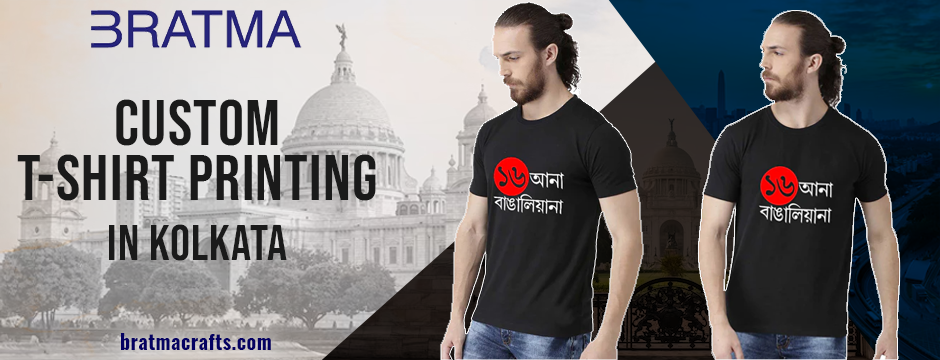When it comes to custom t-shirt printing, selecting the right fabric is crucial for achieving a high-quality, comfortable, and long-lasting result. The fabric you choose not only affects the overall feel and appearance of the t-shirt but also plays a significant role in the printing process. In this blog post, we will explore various fabric options suitable for Custom T Shirt Printing In Kolkata and delve into their characteristics, advantages, and considerations. By understanding the different fabrics available, you can make an informed decision that aligns with your design vision and ensures customer satisfaction.

Understanding Fabric Types
When considering fabric types for custom t-shirt printing, it's essential to understand the characteristics of the main options available. Here are some key points about cotton, polyester, and blends:
Cotton: Natural fibre from the cotton plant is called cotton. Linen is renowned for being supple, breathable, and capable of absorbing moisture. Cotton t-shirts provide a comfortable and classic feel against the skin. They allow air to circulate, making them suitable for warm weather or everyday wear. Cotton is also highly absorbent, which helps keep the wearer dry by absorbing sweat. However, pure cotton t-shirts may be prone to shrinking and can wrinkle more easily.
Polyester: Polyester is a synthetic fabric made from petroleum-based fibres. It offers durability, wrinkle resistance, and excellent colour retention. Polyester t-shirts are known for their strength and ability to withstand frequent washing and wear. They are less likely to shrink compared to cotton and are more resistant to wrinkles. Polyester also has moisture-wicking properties, meaning it pulls moisture away from the body, keeping the wearer dry during physical activities. However, polyester fabrics may not be as breathable as cotton and can feel less comfortable in hot and humid conditions.
Blends: Fabric blends combine two or more fibres, taking advantage of the strengths of each. Cotton-polyester blends, for example, offer a balance between the softness and breathability of cotton and the durability and wrinkle resistance of polyester. These blends can provide a comfortable feel, increased durability, and improved moisture management. Blends can also be designed to enhance specific properties, such as adding stretch with the inclusion of elastane fibres.
Understanding the characteristics of cotton, polyester, and blends allows you to make an informed decision based on factors such as comfort, durability, breathability, and moisture-wicking properties. Consider the specific requirements of your T Shirt Printing Kolkata project and the preferences of your target audience to determine the most suitable fabric type.
Choosing the Right Fabric for Printing
Consider the Design: The fabric you choose should complement your design. For intricate or detailed designs, a fabric with a smooth and even surface, such as 100% cotton, is ideal. If you're printing vibrant colours or photographs, a polyester blend may be more suitable, as it offers excellent colour reproduction.
Comfort and Breathability: Consider the comfort and breathability of the fabric, particularly if the t-shirts will be worn in warmer climates or during physical activities. Cotton is known for its breathability, making it a popular choice for casual and everyday wear. Blends with a higher cotton content can offer a good balance between breathability and durability.
Durability and Longevity: Assess the durability of the fabric, especially if the t-shirts will undergo frequent washing or heavy use. Polyester blends tend to be more resistant to shrinking, fading, and wrinkling, making them suitable for t-shirts that need to withstand regular wear and tear.
Moisture-Wicking Properties: If you're printing t-shirts intended for sports or active use, consider fabrics with moisture-wicking properties. Polyester and polyester blends are excellent choices as they draw moisture away from the body, keeping the wearer dry and comfortable.
Printing Technique Compatibility: Different printing techniques may perform differently on various fabric types. Discuss with your printer or supplier to ensure the fabric you choose is compatible with your desired printing method, whether it's screen printing, direct-to-garment (DTG) printing, or heat transfer.
Sustainability: Increasingly, there is a demand for sustainable fabric options. Consider eco-friendly choices such as organic cotton, recycled polyester, or fabric made from renewable resources. These options align with environmentally conscious values and cater to customers seeking more sustainable fashion choices.
Budget Considerations: Finally, factor in your budget when selecting fabric options. Fabrics like 100% cotton are generally more affordable compared to polyester or speciality blends. However, keep in mind that different fabric qualities and finishes can affect the final price.
Conclusion
Deciding the right fabric for your custom t-shirt printing project is a critical step in ensuring customer satisfaction and achieving the desired outcome. Consider factors such as comfort, durability, printing technique compatibility, and sustainability when evaluating fabric options. Whether you opt for classic cotton, versatile blends, or performance-oriented polyester, understanding the characteristics and advantages of each fabric type will help you make an informed decision that aligns with your design vision, customer needs, and budget.

By selecting the right fabric, you can create custom t-shirts that are not only visually appealing but also comfortable, durable, and well-suited to the intended purpose. Explore unique T Shirt With Bengali Quotes online only at the website of Bratma Crafts at affordable prices. Visit now!

